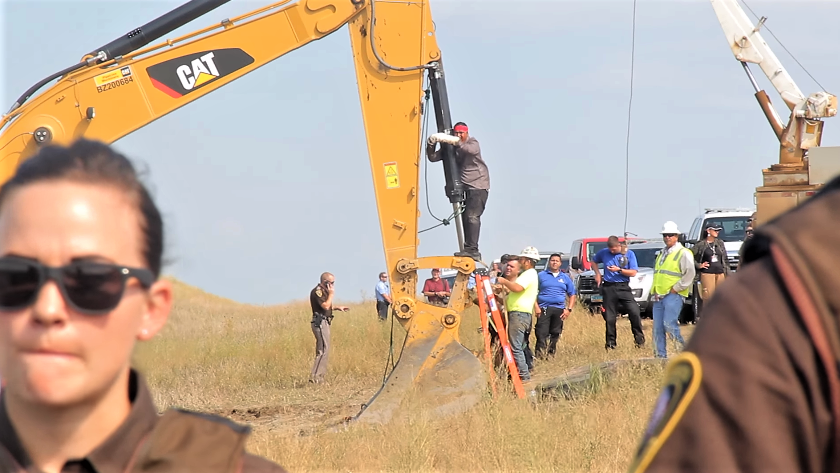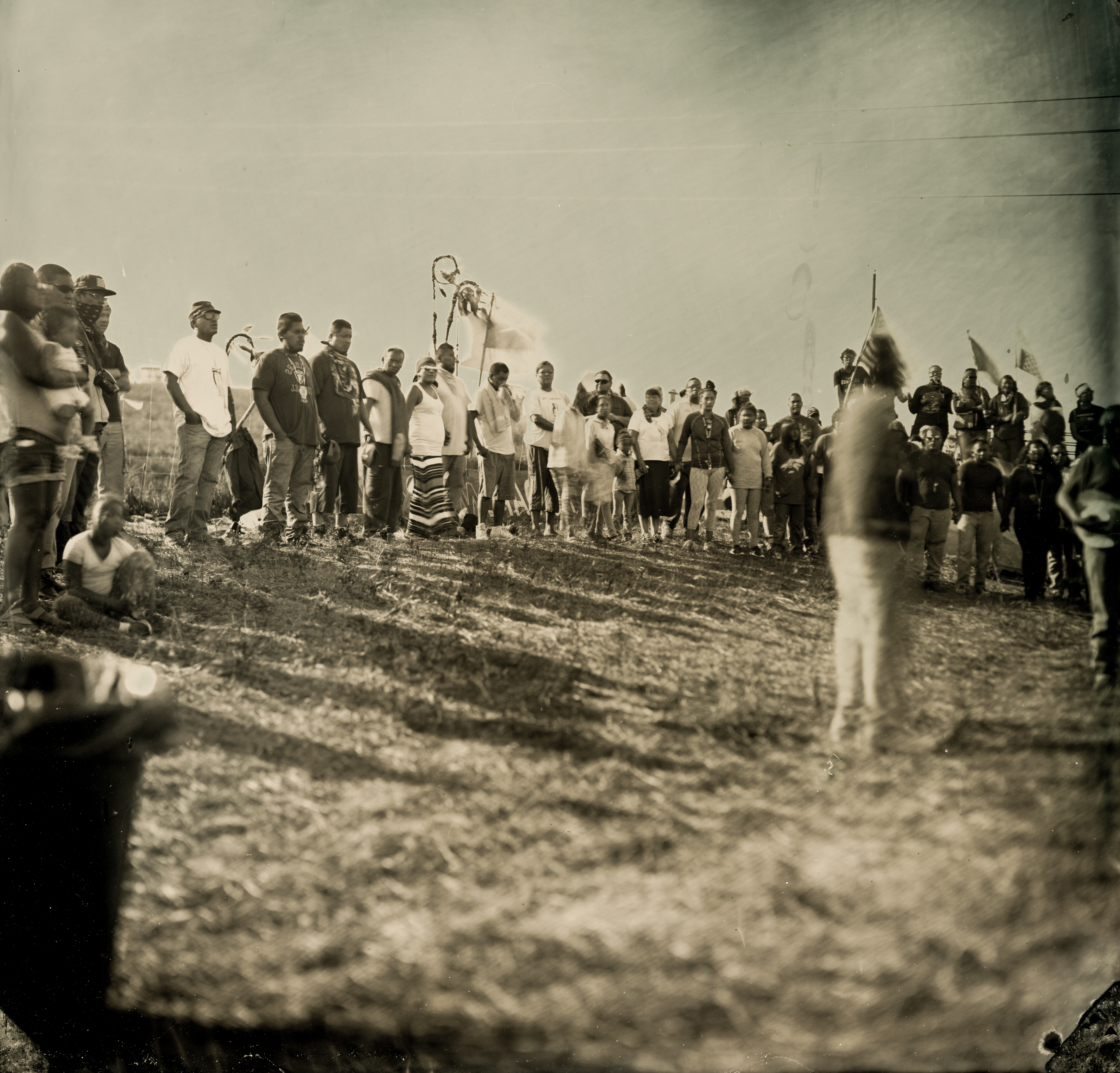Standing Rock, Capitalism, and Ontological Violence – A Christian Response to the Dakota Access Pipeline (Guest Post by Richard Allen)
At the time of this writing, violence is erupting on the plains of North Dakota. In response to protests from indigenous peoples and their fellow supporters to the construction of the Dakota Access Pipeline, private security and local police forces have viciously defended their (prized) construct. Violence is erupting, almost exclusively on the part of the state in response to peaceful protests, but is it confined to the clashes between protester and the state? No—what we witness on the plains of the Standing Rock Reservation is violence, and one of ontology.
The pipeline in question is, on the surface, just another pipeline. It is one of hundreds elsewhere in this country, existing to serve an ostensibly simple purpose: the transportation of crude material for the fossil-fuel industry. It is, arguably, nothing special. Therefore, it is easy to relegate the Standing Rock protests to the binary of “environmentalism versus the free market.” Yet, this binary is the product of the capitalist framework in which these crises erupt. By relegating the protests to questions of mere public policy outside the bounds of ideology (e.g. whether or not the construction satisfies the public and private “interests”), any ability to address the construct which, by nature, thrives upon crisis to substantiate its control over society, disappears from our grasp. We must deconstruct and escape this framework to ascertain the metaphysical violence at work.
In short, the Dakota Access Pipeline is ontological violence because it is violence directed against the communal good by proxy of the pipeline, which has a state of being all its own. Its presence is far more than a physical construct—it is a metaphysical presence to both its constructors and its protesters. Far from being just another pipeline, it is representative of the capitalist abuse of land and people for the sake of profit. Supporters of the pipeline contend that increased access and efficient transportation of crude material will benefit “everyone” because of our collective dependence on fossil-fuel. Thus it should be no surprise that the state and the business class responds to these protests with such force—the pipeline is the ontological manifestation of their ideology, the object of their desire. For capitalists and the liberal state—which has no interest in limiting the inherent greed of the free market—the pipeline is the necessary tool by which increased profit and increased control of the market will arise. For the protesters, the pipeline is the instrument of death and encroachment upon a way of life. The pipeline is ontological and metaphysical violence.
Is there a Christian response to such violence? How should we understand this tension between the individualism and greed of our capitalist framework, with the abject necessity for the communal good? To the ontological dimension of the pipeline, is there a Christian response?
Let us be clear on this fact from the onset: Individualism has no place within the Christian tradition. Thus, ideologies which thrive upon exploitation of the communal good for the sake of the powerful one (or the fortunate few) are to be rejected. The psalmist declares that “the earth is the Lord’s” (Ps. 24:1-2), so to some extent, it could be argued that none of the land or its resources are “ours” to control, only something to steward. Furthermore, God views the abuse of the land and its people as sin:
The sin at work is the disregard of others for the sake of individual benefit. The pipeline is a physical manifestation of this vice, the vice of greed, made immanent and tangible. Simultaneously, by its own ontology, it ignores the plight of the people who depend on the land for sustenance, and disregards the land itself which survives by the work of the people it sustains; the two are inextricably linked. Likewise, consider the prophet Isaiah, speaking to the unrepentant Hebrew people:
Our current framework relegates land and people into objects for control, turning land into property for exploitation, and people into consumers (or obstacles)—there is no nuance or variance to be discerned. Thus, just as God responded to the abusive rich who horded the land only to find themselves—and their “property”—struck by ruin, Christians must resist the very ideology and the systemic propagation of this ideology. It is not enough to be “spiritually” opposed or distantly sympathetic—violence on this scale necessitates a tangible response.
Resistance, however, should not be representative of the violence on the part of the state and the business class. Saint Paul admonished his churches to “overcome evil with good,” and what is good will never be indicative of evil. Protests, participation in our democratic process via legislation and elections, and material support of those most immanently affected by the pipeline—and others like it—are practical, God-honoring ways to uphold the value of the communal good, while not forgetting the individuals involved.
Standing Rock deserves our attention because it illuminates the policy-level, surface tension between the interests of the “free market” and the communal good; that the pipeline construction violates legal treaties is one example of this. But more importantly, it illustrates in very graphic terms the consequences of ideology hell-bent on the accumulation and control of material wealth. The resistance on the part of the state and private security firms to the peaceful protests are indicative of this metaphysical objectification of the pipeline. As mentioned previously, the pipeline is far more than a pipeline—it is the metaphysical actualization of greed and exploitation. The response from both sides is visceral simply because the ontological violence at work is egregiously potent.
The Christian response, borne out of a tradition which upholds the communal good as God-honoring, must be one of solidarity and peaceful resistance alongside our brothers and sisters who depend upon and revere the land for its life-giving potential.
[Ed. note: Richard M. Allen is a student at Regent University, pursuing a degree in Theological & Historical Studies. He writes on the intersections of Christian theology, postmodern philosophy, literary theory, and radical politics. You can follow him on Twitter: @rma_mt]
==================================
Follow @WTravisMcMaken
Subscribe to Die Evangelischen Theologen
The pipeline in question is, on the surface, just another pipeline. It is one of hundreds elsewhere in this country, existing to serve an ostensibly simple purpose: the transportation of crude material for the fossil-fuel industry. It is, arguably, nothing special. Therefore, it is easy to relegate the Standing Rock protests to the binary of “environmentalism versus the free market.” Yet, this binary is the product of the capitalist framework in which these crises erupt. By relegating the protests to questions of mere public policy outside the bounds of ideology (e.g. whether or not the construction satisfies the public and private “interests”), any ability to address the construct which, by nature, thrives upon crisis to substantiate its control over society, disappears from our grasp. We must deconstruct and escape this framework to ascertain the metaphysical violence at work.
 |
| By Desiree Kane [CC BY 3.0], via Wikimedia Commons |
Is there a Christian response to such violence? How should we understand this tension between the individualism and greed of our capitalist framework, with the abject necessity for the communal good? To the ontological dimension of the pipeline, is there a Christian response?
Let us be clear on this fact from the onset: Individualism has no place within the Christian tradition. Thus, ideologies which thrive upon exploitation of the communal good for the sake of the powerful one (or the fortunate few) are to be rejected. The psalmist declares that “the earth is the Lord’s” (Ps. 24:1-2), so to some extent, it could be argued that none of the land or its resources are “ours” to control, only something to steward. Furthermore, God views the abuse of the land and its people as sin:
As for you, my flock, thus says the Lord God: I shall judge between sheep and sheep, between rams and goats: Is it not enough for you to feed on the good pasture, but you must tread down with your feet the rest of your pasture? When you drink of clear water, must you foul the rest with your feet? And must my sheep eat what you have trodden with your feet, and drink what you have fouled with your feet? (Ezekiel 34:17-19)
The sin at work is the disregard of others for the sake of individual benefit. The pipeline is a physical manifestation of this vice, the vice of greed, made immanent and tangible. Simultaneously, by its own ontology, it ignores the plight of the people who depend on the land for sustenance, and disregards the land itself which survives by the work of the people it sustains; the two are inextricably linked. Likewise, consider the prophet Isaiah, speaking to the unrepentant Hebrew people:
Ah, you who join house to house, who add field to field, until there is room for no one but you, and you are left to live alone in the midst of the land! The Lord of hosts has sworn in my hearing; Surely many houses shall be desolate, large and beautiful houses, without inhabitant. For ten acres of vineyard shall yield but one bath, and a homer of seed shall yield a mere ephah. (Isaiah 5:8-10)
Our current framework relegates land and people into objects for control, turning land into property for exploitation, and people into consumers (or obstacles)—there is no nuance or variance to be discerned. Thus, just as God responded to the abusive rich who horded the land only to find themselves—and their “property”—struck by ruin, Christians must resist the very ideology and the systemic propagation of this ideology. It is not enough to be “spiritually” opposed or distantly sympathetic—violence on this scale necessitates a tangible response.
 |
| By Shane Balkowitsch [CC BY-SA 4.0], via Wikimedia Commons |
Standing Rock deserves our attention because it illuminates the policy-level, surface tension between the interests of the “free market” and the communal good; that the pipeline construction violates legal treaties is one example of this. But more importantly, it illustrates in very graphic terms the consequences of ideology hell-bent on the accumulation and control of material wealth. The resistance on the part of the state and private security firms to the peaceful protests are indicative of this metaphysical objectification of the pipeline. As mentioned previously, the pipeline is far more than a pipeline—it is the metaphysical actualization of greed and exploitation. The response from both sides is visceral simply because the ontological violence at work is egregiously potent.
The Christian response, borne out of a tradition which upholds the communal good as God-honoring, must be one of solidarity and peaceful resistance alongside our brothers and sisters who depend upon and revere the land for its life-giving potential.
[Ed. note: Richard M. Allen is a student at Regent University, pursuing a degree in Theological & Historical Studies. He writes on the intersections of Christian theology, postmodern philosophy, literary theory, and radical politics. You can follow him on Twitter: @rma_mt]
==================================
Follow @WTravisMcMaken
Subscribe to Die Evangelischen Theologen


Comments